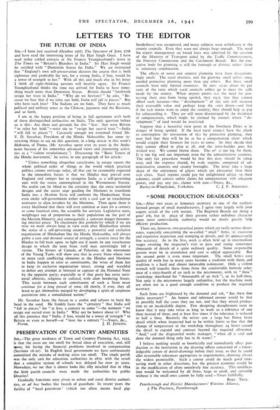LETTERS TO THE EDITOR
THE FUTURE OF INDIA
Sist,—I have just received (October 19th) The Spectator of June 27th and have read the interesting letter of Sir Hari Singh Gour. I have read today cabled extracts of Sir Francis Younghusband's letter in The Times on " Britain's Blunders in India." Sir Hari Singh would be satisfied with " Dominkin Status foi India." We are instructed that " England's own self-preservation dictates the course that is both righteous and profitable for her, for a strong India, if free, would be a tower of strength to her." With all this and much else in his letter I think all right-thinking persons will heartily agree. Sir Francis Younghusband thinks the time nas arrived for India to have some- thing much more than Dominion Status. Britain should " forthwith resign her trust in India." " Why do we hesitate? " he asks. " Be- cause we fear that if we relax our hold, India will tali to pieces." But why have such fear? The Indians are no fools. They have as much political and military sense as the Chinese, Japanese and the Russians, and so forth.
I am in the happy position of being in full agreement with both of these distinguished authorities on India. The only question before us is this: Are there real grounds for this "fear.- that were Britain " to relax her hold "—were she to " resign her sacred trust "—India " will fall to pieces "? Curiously enough my esteemed friend Mr. V. D. Savarkar, President of the Hindu Mahasabha, has some in- teresting things to say on this question, in a long article In this week's Mahratta, of Poona. (Mr savarkar spent over 20 years in the Anda- mans because of his somewhat advanced views and interesting activi- ties as a " violent revolutionary.") Discussing the " Basic Tenets of the Hindu movement,' he writes in one paragraph of his article: " Unless something altogether cataclysmic in nature upsets the whole political order of things m the world which practical politics cannot envisage today, all that can be reasonably expected in the immediate future is that we Hindus may prevail over England and compel her to recognise India as a self-governing unit with the status contemplated in the Westminster Statute. No realist can be blind to the certainty that the extra territorial designs and the secret urge goading the Moslems to transform India into a Moslem State will confront the Hindusthani State even under self-government either with a civil war or treacherous overtures to alien invaders by the Moslems. Then again there is every likelihood that there will ever continue at least for a century to come fanatical riots, the scramble for services. Legislative seats, weightages out of proportion to their population on the part of the Moslem Minority and consequently a constant danger threaten- ing internal peace. To checkmate this probability which if we are wise we must always keep in view even after Hindusthan attains the status of a self-governing country, a powerful and exclusive organisation of Hindudom like the Hindu Mahasabha, will always prOve a sure and devoted source of strength, a reserve force for the Hindus to fall back upon. to fight out if needs be any treacherous design to which the joint State itself may unwittingly fall a victim. The history of Canada, of Palestine, of the movement of the Young Turks will show you that in every State where two or more such conflicting elements as the Hindus and Moslems in India happen to exist as constituents, the wiser of them has to keep its exclusive organisation intact, strong and watchful to defeat any attempt at betrayal or capture of the National State by the opposite party; especially so if that party has extra terri- torial affinities, religious or cultural, with alien bordering States. This tussle between such constituents of such a State must • continue for a long period of time, till slowly, if ever, they all learn to get themselves merged by developing a spirit of corporate patriotism into a consolidated nation."
Mr. Savarkar faces the future as a realist and refuses to bury his head in the sand. He frankly faces the " certainty " that India will " fall to pieces," for " at least a century to come "—the moment " we resign our sacred trust in India." Why not be honest about it? Why all this pretence that " India, if free, would be a tower of strength " to Britain or even to herself—at " least for a century "?—Yours, &c.,






















 Previous page
Previous page